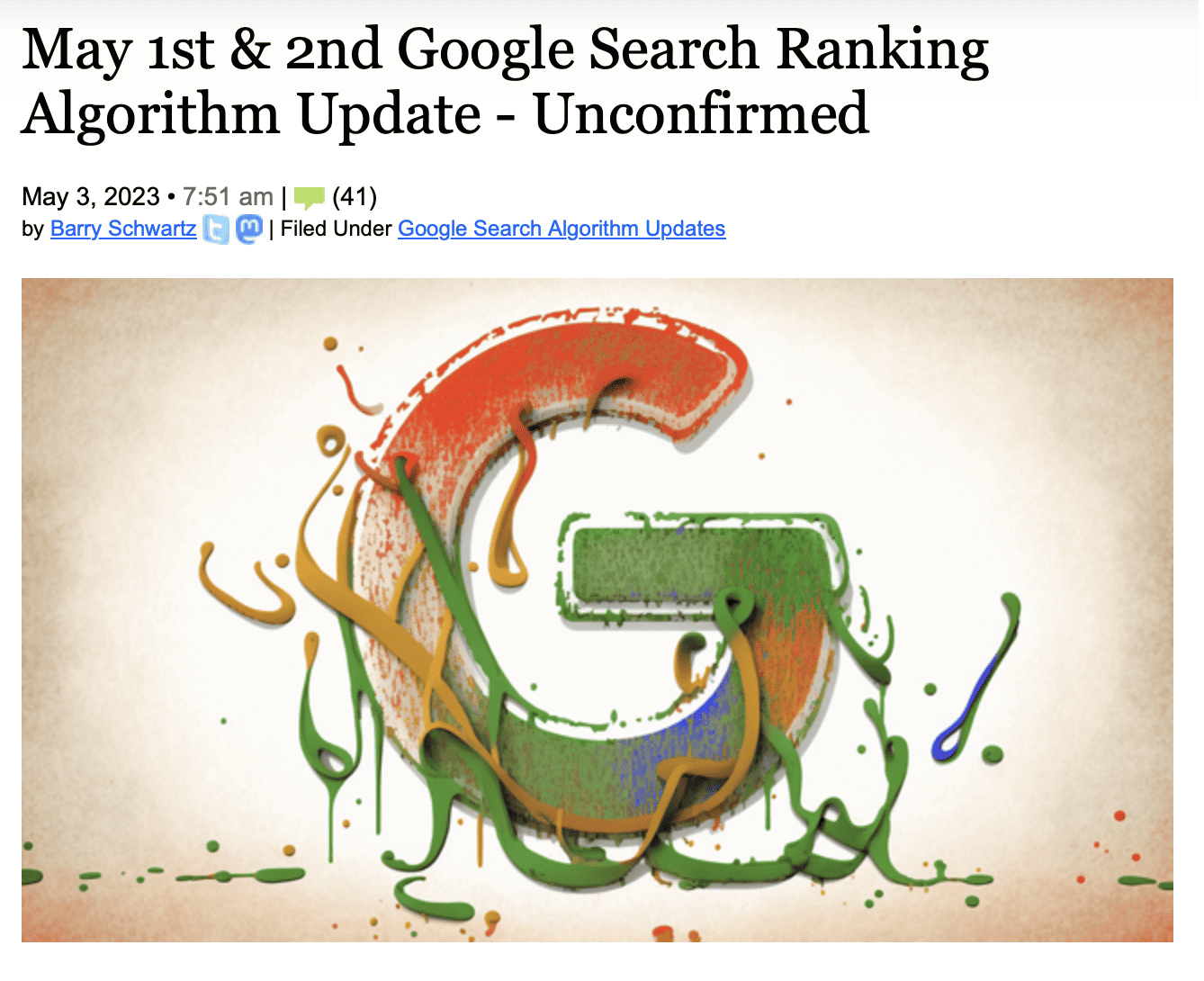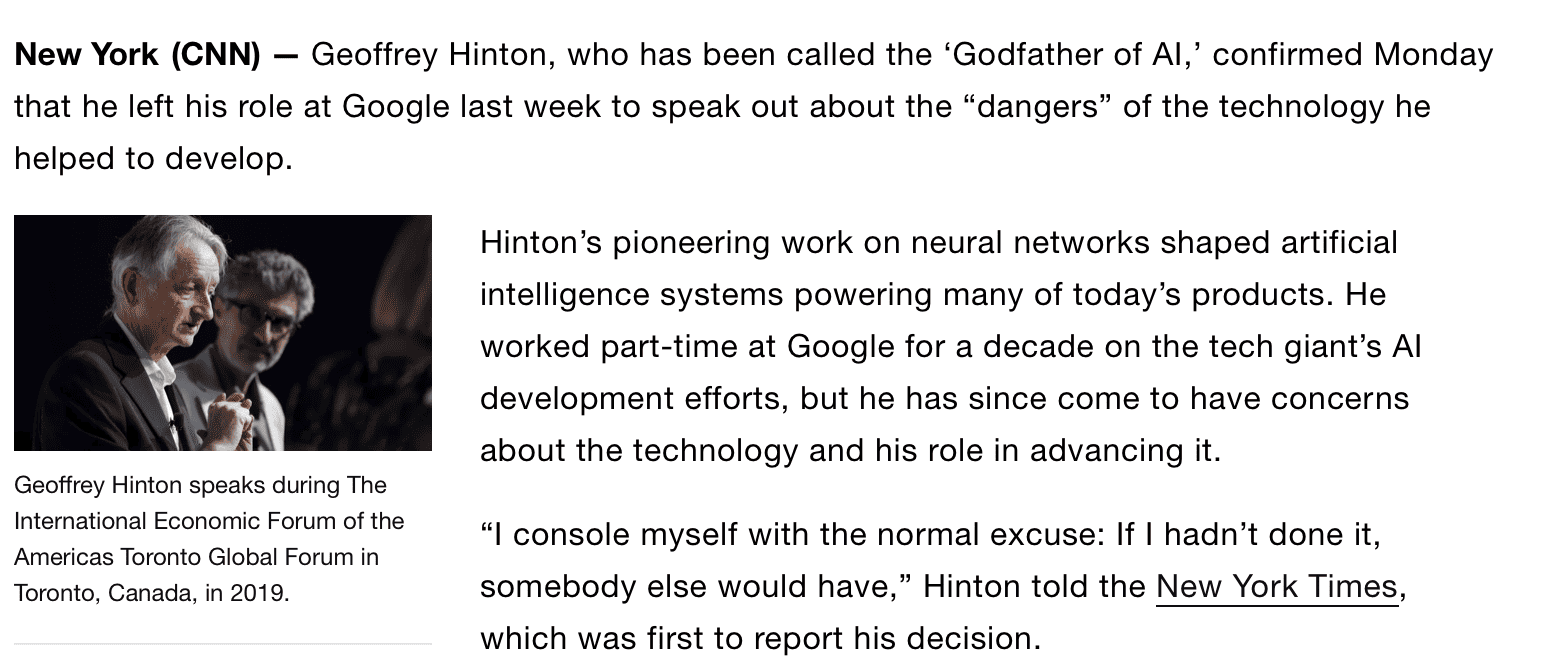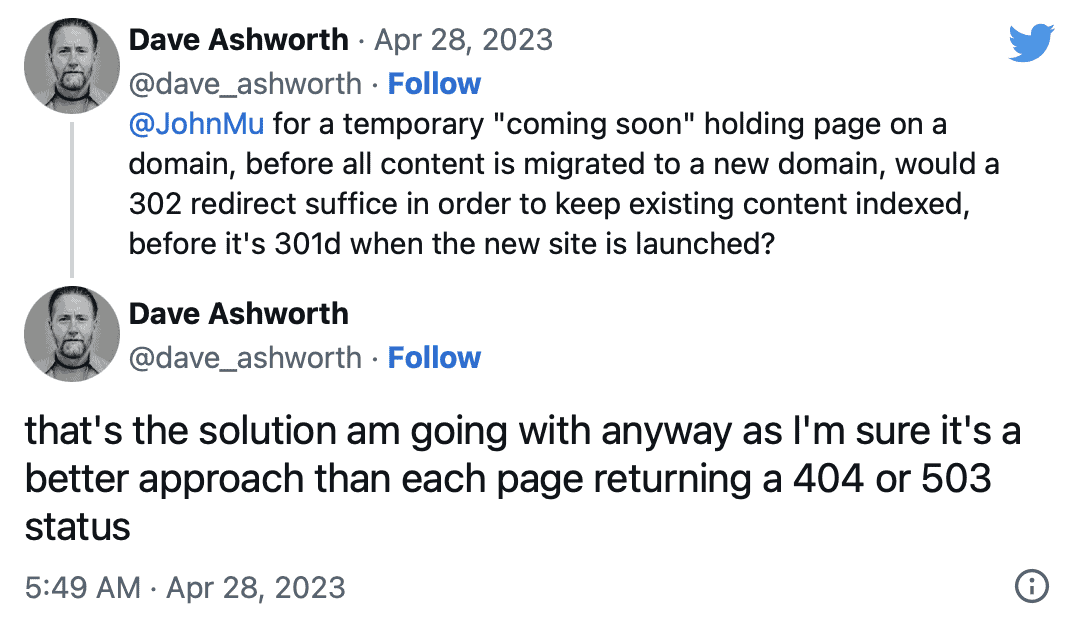Ross and Scott discuss AI pioneer quitting Google to warn about the technology’s danger, the use of historical data to evaluate search quality, and more Google updates.
Noteworthy links from this episode:
- Google Market Share
- AI pioneer quits Google to warn about the technology’s ‘dangers’
- Google UA historical data will be available until July 1, 2024
- May 1st & 2nd Google Search Ranking Algorithm Update – Unconfirmed
- April 2023 Reviews Update Finished
- Google no longer recommends canonical tags for syndicated content
- Google Search Video Results With Pros and Cons Within Video (May 2nd)
- Google: Avoid Using “Coming Back Soon” Pages For Site Migrations
Transcript:
Ross: Hello, and welcome to SEO 101 on WMR.FM Episode number 449. This is Ross Dunn, CEO of StepForth Web Marketing, and my co-host is my company’s Senior SEO, Scott Van Achte.
Well, you had a good weekend, you’re just telling me about your bowling, and I didn’t ask you, “Did you guys win anything?”.
Scott: We came in second place for our team for the men’s team, which is maybe the best we’ve ever done. We live in a town called Courtney. We have an old bowling alley, like literally the oldest bowling alley in British Columbia, and it’s in probably the worst shape of all the bowling alleys. And so, we’re not the best bowlers, because we don’t bowl on the best lanes.
So usually, our teams come in third or fourth in this tournament and we came in second. So that’s phenomenally good. We had two bowlers from Courtney that won first place in a singles event and the other got the All-Star Award for the whole thing. As a team, we did quite well in what we usually do. So no, it was great. Lots of fun. Good laughs.
Ross: Awesome!
Scott: All that stuff.
Ross: Excellent! Well, let’s jump into this. We’ve got news about the Google Market Share, which I had to say I wasn’t surprised at. Ah, I thought it dropped. Here we go. You show me what’s going on here?
Scott: Yeah, we don’t really talk about Market Share anymore, which is funny, because I remember when I started with StepForth, we did a monthly blog post on the Market Share, and it changed so dramatically back then.
Everybody was at, like 25% kind of thing. So, it was dramatic fluctuation and then it got to a point where Google just sort of hovered around 90% forever, and it got boring, and then we don’t talk about it anymore, because it doesn’t change.
But I just happen to be looking at statcounter.com for their current Market Share and saw some stats by country and a little bit interesting. You know, one fact like April of this year, just last month, the United States had an 88.89% Market Share for Google. Sorry, Google had 88.8% in the United States.
Whereas they were kind of at the lower end of the countries. I looked at the regions, and India was super high at 98.53%. But what I kind of found interesting is if you look at the stats for Canada, worldwide, Asia, and some of the other countries over the past year, since April, or even if you go back 10 years till April 2013. They’re kind of all the same, it’s like plus or minus one or 2%.
Mostly plus, or as marketers increased by about a percent or two across the board, except for the United States in April 10 years ago, it was at 79%.
So they’ve actually gone up 10% in the last 10 years, which I don’t know, that really surprised me. Why is just the US growing? Everyone else has kind of reached that peak, and Bing sort of been low percentage for a long time. Now, I guess back in April 2013, Bing probably still having a good marketer. I didn’t look at that.
Ross: That’d be interesting to see how much they might be increasing. I think more so next year since Bing is really proving the leader in AI right now. So, we’ll see.
Scott: Yeah, I should have pulled that data. Should we cancel and start recording over again?
Ross: No, no. It’ll be the next one. We’ll remember that, for sure.
Scott: Sure. Okay, next report. I’ll look at Bing and we’ll do a little comparison for fun.
AI pioneer quits Google to warn about the technology’s ‘dangers’
Ross: Okay, well, on a kind of scary note, an AI pioneer, one of the AI pioneers has quit Google to warn about the technology’s dangers.
This has happened multiple times now where the guys who have literally been behind inventing AI are freaking out and yet all of us are not! I’m wondering what’s wrong with us because if they’re freaking out, we should be freaking out. We should be listening. This all gives me the creeps.
Anyway, his name is Geoffrey Hinton. His nickname is the godfather of AI and left his role at Google to speak out about the dangers of technology. He helped develop the sums just like Terminator.
Scott: Exactly the same. I think that’s where I got that quote from.
Ross: He worked with Google part-time for more than a decade and AI systems were shaped by neutral networks that Hinton pioneered. Creepy. And I remember reading about this at the time but prominent figures, a lot of them, like I think Elon Musk or a bunch of people that are far more in the know about AI, signed a letter calling for artificial intelligent labs to stop the trading of most AI systems for at least six months. The reason was, “profound risks to society and humanity”.
Scott: Yeah, it’s not just serving it all.
Ross: Now, my friend Andy is really into this stuff. I wouldn’t be too if I had the energy at the moment, but he’s having a hard time sleeping, and reading some of the stuff.
So, I think we should be really concerned. It seems ridiculous based on what we’ve seen so far but that’s what’s been released publicly. Gosh knows! what happened and is running in these labs?
Scott: Well, even you think like GPT-3 is pretty amazing for what it is, or now 3. Is 4 released?
Well, there we go. So, 5, when that comes out, which is probably already underway, and 6, and is it? I don’t know, like, part of me says, “This is ridiculous. Why are we worried about this?”. It’s a joke, and she’s going to take over and then another part is like, well, when I’m living in a tunnel hiding from the machines, and you know, a couple of years from now, hopefully, at least give me a decade machines, please. Like at least 10 years. That’d be nice! And there’ll be all looking back like, “Wow! Why are we such idiots?”. It’s like every movie ever. Every futuristic movie predicts us all of them do.
Ross: Yeah. Well, it’s in everything. Now I’m seeing it. Even the system we use, HR Partner, they have a thing that when I was trying to write something, it popped up saying, “Hey! Would you like to use AI to write this?” And like, “Why not?”, It’s getting awfully easy, and a lot of people are talking about, from the SEO perspective, pulling this back online here on track.
It doesn’t cease to amaze me how much argument there still is about it. Many different feelings about how it should be used, whether you should be using it for SEO, et cetera.
I think it’s ridiculous. If you don’t maximize your content by using it just wherever possible. And I’ll say this again, and again, maximize it with your own knowledge and your own point of view.
Be a thought leader, don’t just use what’s given to you because everyone’s going to have access to that. They can all do that themselves with a push of a button. So, you need to add your own value to it. When you do that, and you perhaps rewrite some stuff to make it sound a little bit better, it’s excellent. Why not use it, be crazy not to? And who it’s nerve-racking this whole thing.
All right, on to Google Analytics. So, what’s this all about?
Google UA historical data will be available until July 1, 2024

One thing we didn’t know until very recently, until a few days ago, was when you would have access to that old data until, and Google has come out and said, “You will have a full year, you will have until July of 2024 to backup, download, save access, whatever your old Universal Analytics data. As of July 2024, goodbye!
If you haven’t backed it up, you’re out of luck. So, it’s good to know, because we didn’t really know if they were going to give you a week, a month, a year? We didn’t know.
So now we know we’ve got a full year to back everything up. I would suggest just waiting until after July, we’ve got the cutoff date and then back everything up once it stops recording, because then you’ve got the maximum daily you can get out of it.
So, and then wait until June 28, 2024 and then panic, “Oh, no, I forgot to backup all my data and then freak out and call us because we’ll be masters at it by then”.
Ross: We might have a backup but we still hopefully by then, we’ll know what to do with it because as far as I know, you need to use like big data to really do anything with it. That’s a bit above our skill level at the moment.
Scott: So, it will get there but not there at the moment.
Ross: Well, maybe ChatGPT can do it for us.
Scott: Probably.
May 1st & 2nd Google Search Ranking Algorithm Update – Unconfirmed
Ross: Alright, so some more algorithm updates have not been confirmed but appear to be happening right now. It’s again unconfirmed, but as of May 1, May 2, they seem to be running. The Google Search Status Dashboard is not reporting any updates though.

April 2023 Reviews Update Finished
Scott: Yeah, the April 2023 Product. Sorry, not Product, just Reviews Update did wrap up at the end of April after about, I think it was 13 days to roll out that one.
So, if your website was affected at all by that Reviews update, you will see it by now. In our last episode, I think it was happening. We were in the middle of it when we recorded the last SEO 101.
If you see any more disruptions after April 25, those are unrelated to that update. Again, this is an extension of the product reviews update, which is now affecting not just product reviews, it affects reviews for services, businesses, destinations, and any kind of media like games, movies, music, TV shows, and all that kind of stuff.
If you have any of that type of stuff on your website, take a look. Have you been affected by it? If not, you’re in good shape, if you have, hopefully, it was for the better. I don’t know.
As for the reports of command as well that through Semrush, Rank Ranger, and a few others show that this update was significantly more volatile than the previous product review updates.
So it makes sense if you’re affecting more verticals, and it would be more significant, but maybe even in those individual product websites from before, it’s more effective or not effective.
Ross: Words are our friend today.
Scott: Yeah, I’m good at words.
Ross: Oh, I’m so sorry, Justeen. Justeen is my EA and she’s going to be trying to go through this script after it’s been translated or transcribed.
Scott: Wow! We’re even apologizing for not being able to use words correctly, we can’t use the words correctly. It’s like a blooper reel type of stuff here.
Ross: Got it. All right. On that note, let’s take a quick break and we’re going to come back with some news on canonical decks.
Ross: Welcome back to SEO 101 on WMR.FM. Hosted by
myself, Ross Dunn, CEO of StepForth Web Marketing, and my company’s Senior SEO, Scott Van Achte
Google no longer recommends canonical tags for syndicated content
Ross: Google is no longer recommending canonical tags for syndicated content. Now, this is something that I don’t think many people even consider or even think about, but if you have a fair bit of content on your site, and you regularly allow other sites or want them to publish it, in other words, syndicate a copy of it, Google now recommends that those other sites block that syndicated content from being indexed.
I think that’s crazy. But anyway, previously Google had recommended those pages containing your syndicated content, utilize the canonical tag to direct back to your original source, which makes perfect sense to me.
Why the hell wouldn’t they do that? This is one of those things where it’s a WTF moment, I have no idea what they’re thinking, why they need to make this change. It looks weak to me. What are your thoughts, Scott?
Scott: I don’t know that people are going to do it because people syndicate content for SEO purposes, even though they’re not supposed to but let’s be real, that’s why most people do it.
If you’re blocking that content on wherever it’s going, the only value you get is any kind of branding plays or whatever, right? Or maybe you get some direct traffic from those, which is great, depending on where this content is going.
Don’t get me wrong, but there’s not really any SEO value necessarily, which technically shouldn’t be because that’s bad. I feel like it’s kind of unnecessary.
One of the things they cited in that article was that this is helping to prevent the syndicated content from outranking the original source content. Now, in theory, the canonical tags should do that anyways, although it’s a suggestion, not a directive.
But still, I guess Google did once some years back. They played with some source meta tags, like a syndicated source and original source meta tags, and good people didn’t use it, so, Google stopped supporting it, and to be honest, I haven’t heard of that meta tag until today. So that’s why nobody used it because nobody ever heard of it, I guess. I don’t know.
Ross: I remember covering it but it was definitely a long time ago, and certainly never used it. Now, a lot of these other sites that are syndicating, let’s say your content, whatever content it is that you have may not have been putting the canonical in and then yes, you weren’t getting the full benefit of it on your website, because frankly, a lot of these sites don’t have the ability to change the canonicals perhaps or don’t know how or don’t want to or just play too lazy.
So, that aspects, this corrects, but they’re not going to block it. Google, just stop!
Scott: I think this is Google. Google saying something no one’s going to listen, no one’s going to do anything, and it probably won’t matter at the end of the day, but if you want to be by the book, and you’re very rigid on how you do things by the book, this is what you should do. Should you do it? I don’t know. It’s up to you.
Ross: I don’t think so. I don’t think it’s pointless. But anyway, stick with the canonical tag. If they want to make a big deal of it, they can, at some point, but I still think it’s ridiculous.
Google Search Video Results With Pros and Cons Within Video (May 2nd)
Ross: Okay, so let’s move on to Google Search video results with pros and cons. So this is a post Barry put up. It’s a bit speculative, but I liked it because it showed a really interesting part of Google’s video algorithm, or an aspect of it, and that is that it was able to pick out when pros and cons were noted within the video.
Now, this is something that’s been allowed in text or possible by using rich result markup, Google could identify pros and cons within the content and actually show it within search results.
It was kind of like a grayed out bit underneath the listing, but this is the first time, to Barry’s knowledge, certainly mine, because I have various way more in touch than I am on the stuff that he’s seen this happen where in a video, rich result listing in search results where it showed the video and particular clips with key moments, which is normal, we’ve seen that before, where you could jump to components of the video, there’s a new area that says pros and cons from this video.
So you could jump right to those pros and cons into these related areas. I think that’s really cool! I guess it never ends, just how much they can do with this, and when they are going to use the pros and cons is going to be entirely up to the quality of the video and whether they can get that kind of signal and they determine it’s worthwhile.
Who knows how often we’re going to see this, it might be something that’s extremely rare, but the fact that they can do that, it’s really cool!
Scott: It’s all pretty amazing. YouTube has come a long way, in the past few years. I mean, I remember I was blown away when they could just sort of auto generate transcriptions, even though they were heavily flawed. That was huge and now that’s nothing. Now that’s just like, that’s one-on-one stuff that they mean, captions are really useful to pull the full transcription of a video and the punctuation was a mess and it wasn’t great but it was something right.
Ross: I still think that when they auto generate captions, it’s pretty cool. It’s not flawless, but it’s darn good, even now. The fact that still not flawless is amazing but it’s still pretty good.
Okay, we have a Mueller file, you want to take it away?
Scott: Yeah, I don’t know what this one is.
Google: Avoid Using “Coming Back Soon” Pages For Site Migrations
Ross: No problem, then. So, when you have an issue with your website, and let’s say you’re about to redo it, completely redo it, for some reason, I still don’t really understand why this is even necessary nowadays, even for large sites. People put up a “Coming Back Soon”, “Under Construction” sign and they have it down offline while they’re working on it.
Nonsensical to me, and I’m sure there are cases for this that I just haven’t experienced in the enterprise realm, but from a classical standpoint, it just doesn’t make sense.
Anyway, if you have to have it, back in 2009, John Mueller recommended using a 503 server status code and this code would state to Google that this is something that is temporary, you know, it’s not going to be there forever. This is just something that’s happening, and it will be turned back to normal.
Now, he said that one to two days max is recommended for 503. This is recent as of yesterday. “For anything longer, it’s going to be painful regardless of how you do it”.
In other words, if you’re going to have any kind of downtime, make sure it’s very short, and if you don’t make it short, it doesn’t matter what error code you put out there or server code, it’s going to harm your authority.
I guess it’s not authority, your footprint on Google, how they’re perceiving you and your rankings. I’d say the takeaway is don’t have downtime.
I mean, these days, if you can, you should have the existing site running while you’re working on a second one in the sandbox and getting it ready to go and polished up and then do the transition.
Now I can see the transition in big enterprise level businesses taking some time, but I can’t see it taking more than two days. Again, I’m not experienced in the enterprise realm so those can build millions and millions and millions of pages. So, I suppose it can be painful.
Scott: These things worried me all the time, even if it’s two hours, like any downtime at all, if you can avoid it. You’re asking for trouble even if you have to do it. I don’t know the answer to that. Like, if you have no choice for whatever reason system, all the systems have to come together and it has to be down for a couple of days to make that work and it’s tough, but I guess follow his advice and stick with the 503. That’s what they say to do. Although that kind of makes me nervous.
So 500 error on your website can’t be good for rankings. As I don’t feel like it’s a pretty good way to get you indexed in a hurry but if your’e maximum two days, I guess, you’ve got some buffer there, especially with the enterprise sites.
Ross: Technically telling Google that it’s a service unavailable and indicates a performance issue on average origin servers is quoting from Amazon. So, I think it’s good. It does tell them that this is a problem, but it’s something likely going to be fixed, and Google will put you in this limbo for a little while but he’s saying that Limbo is going to be no more than two days or at least you’re playing with fire after two days.
Good. That’s good info. Quite a bit of difference between that into 2009, isn’t it?
Anyway, all right, what’s the last bit here?
Scott: The last one is just a little bit of something that popped up on the weekend of all times. I had a client email me on the weekend while I was at the Bowling Tournament that we talked about a little bit, and I don’t even know why I checked my work email, like, what was I thinking? Even checking it? I don’t know but I checked it.
I had this email and he’s freaking out because his analytics basically stopped recording data. There was like, nothing. He’s like, “Oh, what’s happening? What’s happening?” So like, while I was on my phone, there wasn’t I was nowhere near a computer. There’s nothing I could do, and I messaged Dennis Stenderchuck, like, “Can you take a look into this?” but he was away at Merritt running a marathon or something. It’s just like, bad timing for it.
Anyways, we think we got that figured out. What happened was client got back to me shortly after he had it fixed. They did a theme update on his WordPress site, and when the theme updated it, for whatever reason, killed his Analytics code, and he contacted his web host and they fixed it, put the code back in whatever he just said, they fixed it,
I don’t know what they actually did and everything was back up and running again.
The reason I bring all this up is because we talk a lot about making a backup of your site, make a backup, you should make a backup before you do stuff but this wouldn’t really be fixed by a backup, because you still have to update the theme again, but I think what a lot of people do is when they do these updates, you go back and you look at the website, it looks good.
Maybe you do some contact form submissions, you go through a purchase to make sure everything’s working. It’s great. I don’t think many people go out and look at third party applications that they’re using, like, “Is my Google Analytics still recording data?” I mean, does anybody do that? Like, I don’t even know if I do that, like I have, but it’s not, will be now on the list of things to check right away, make sure it’s recording, make sure your Google Search Console is still verified because if you’re using the meta tag, which most people aren’t really using that method anymore, if you’re using the Meditec method, or upload the file method for verification, that could disappear, and then that’s not a huge issue, you just have to re-verify it later.
Things like that, make sure you check that stuff because if he didn’t happen to check his analytics within a day, who knows how long it would have gone without recording data, like, we would see it eventually, but I mean, you might have a few days or weeks or if you’re a client of ours, that won’t go months.
If you’re just doing it by yourself, you might go months, maybe even years, like we’ve had clients come to us with a whole year plus gap and their analytics data because they just don’t check it. Like what it’s not working like I don’t know. So, check that stuff. Make sure it’s working, especially after doing theme, WordPress updates, plug-in updates, just make sure it keeps working because you never know.
Ross: For one thing I want to say though, is a couple things here. One is that you’re not doing a lot of the transitions anymore. We have a team that does that so they know to check for that, just for the record. Make sure to look for the analytic.
Scott: Oh, sorry. Yeah. From our from the StepForth side of things. Yes.
Ross: And I knew I was going to forget number two. Oh, number two was that I did see that email, and I would have jumped on it but it wasn’t like his website was down and I figured that would be fixed.
So, if we do have a client who’s got an issue on a weekend, we’re on it. Just setting the record straight because it’s important. You need to know that we’ve got your back, and something like this, you know when your analytics goes down for a day or two, I don’t know if you can wait till Monday.
That’s not at the end of the world. Business critical. No, it isn’t. And I’m glad you got it fixed though. No, it’s very important to them and I’m glad he got it fixed.
Anyways, I hope you enjoyed the show. On behalf of myself, Ross Dunn, CEO of StepForth Web Marketing, and my co-host is my company’s Senior SEO, Scott Van Achte, thank you for joining us today!
Remember, we have a show notes newsletter you can sign up for at SEO 101 radio.com where you don’t have to miss a single link and you can refresh your memory of a past show at any time.
Have a great week and remember to tune into future episodes which are twice a month on WMR.FM.
Scott: Great! Thanks for listening everybody!



